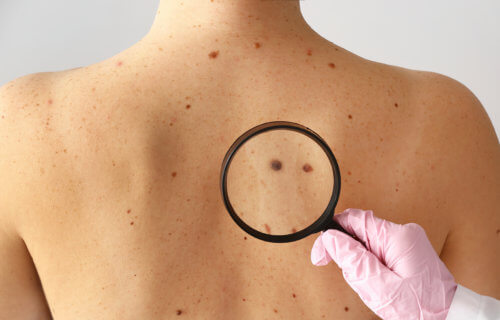LONDON — A new class of immunotherapy shows promise in fighting the most aggressive form of skin cancer. The study authors investigated whether a novel antibody can target and treat melanomas. Their results show that the antibody activates the immune response to fight cancer and slows melanoma growth in mice.
Malignant melanoma is the most aggressive type of skin cancer, with poor survival rates for half of patients within five years of diagnosis. While there has been significant progress in developing immunotherapies — drugs that stimulate the body’s natural defense system to attack cancer — many patients’ tumors do not respond to the treatment. This drug could benefit those patients with melanoma who do not respond to existing treatments.
Many existing immunotherapies used in cancer treatment belong to the antibody type called IgG. However, researchers at King’s College London and Guy’s and St Thomas’ have developed an IgE antibody that can use the patient’s own immune system to attack cancer in a different way.
Researchers developed an IgE antibody specific for a marker on the surface of human melanoma cells called chondroitin sulfate proteoglycan 4 (CSPG4), which is found in up to 70 percent of melanomas. Immunotherapies currently available draw broadly upon the immune system’s defenses. However, this new antibody was designed to target immune responses specifically toward melanoma cells.

The researchers showed that CSPG4 IgE could attach to and activate immune cells found in melanoma patient blood to kill human melanoma cancer cells. CSPG4 IgE treatment slowed cancer growth in mice implanted with human immune cells, including cells from patients with melanoma. An allergy test conducted with patient blood found that CSPG4 IgE did not activate white blood cells called basophils, indicating that the therapy may be safe to take.
“We have shown that an immune response can be triggered by IgE immunotherapy for melanoma and that this applies to human melanomas and to melanoma patient immune responses. Our findings replicate existing observations for MOv18 IgE, the first anti-cancer IgE, which targets ovarian cancer, and supports the development of IgE therapies for other solid tumors,” says Dr. Heather Bax, a postdoctoral research fellow, in a university release.
“Four in ten people with advanced melanoma do not respond to available treatments. Our findings show that the human immune system reacts differently in the presence of drugs based on IgE antibodies and points to the potential of applying IgE to mount an effective response against melanoma. This opens up the possibility of this new class of drugs to benefit different patient groups and a new frontier in the battle against cancer,” adds Professor Sophia Karagiannis, from the St. John’s Institute of Dermatology.
The first IgE antibody (MOv18 IgE) generated at King’s College London has been trialed for ovarian cancer, and results are expected to be published later in 2023. Epsilogen Ltd owns rights to both CSPG4 IgE and MOv18 IgE. Epsilogen was spun out from King’s College London in 2017, and the team says it has attracted venture capital financing from multiple investors.
These promising results provide hope for melanoma patients who do not respond to existing treatments. However, further research is necessary to determine the effectiveness and safety of the CSPG4 IgE antibody in humans. The researchers plan to continue studying the antibody to investigate its potential for use in other solid tumors. If successful, IgE immunotherapy could represent a new class of drugs in the fight against cancer.
The study is published in the journal Nature Communications.

